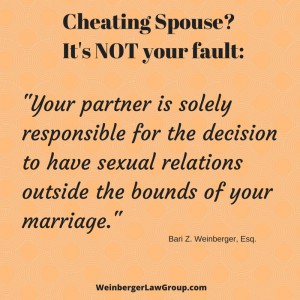Spouse Cheated? 5 Tips For Overcoming Adultery
 Adultery is often cited as the leading cause of divorce, but does cheating always need to spell the end of a marriage? Finding out your husband or wife has been unfaithful can be excruciatingly painful, but when both spouses are willing to do the work, it may be more possible than you think to move past adultery and reconcile your relationship. If your marriage is in danger of being shattered by infidelity, here are some ways you still may be able to pick up the pieces.
Adultery is often cited as the leading cause of divorce, but does cheating always need to spell the end of a marriage? Finding out your husband or wife has been unfaithful can be excruciatingly painful, but when both spouses are willing to do the work, it may be more possible than you think to move past adultery and reconcile your relationship. If your marriage is in danger of being shattered by infidelity, here are some ways you still may be able to pick up the pieces.
Don’t Blame Yourself: Was it something I said? Or something I did? Or something I didn’t do? Because finding out a spouse has cheated is enough to rock anyone’s sense of self-worth, try to keep this thought in the forefront: your partner is solely responsible for the decision to have sexual relations outside the bounds of your marriage. As part of the forgiveness process, your spouse taking “ownership” of the cheating can be critical to rebuilding your relationship on strong footing. If you send or accept the message that somehow you are to blame, it can leave the door open for your spouse to never truly accept responsibility for their actions.
Be Honest: Anger, jealousy, sadness, embarrassment, shame and deep hurt. Whatever combination of emotions you experience as the result of your spouse’s infidelity, allowing yourself to experience these emotions, and taking steps to work through them, requires being honest with yourself — and your spouse — about the way you feel. Many couples trying to save their relationship after an episode of cheating benefit from seeking relationship counseling because it provides a safe place to vent these kinds of emotions in front of their partner. Working with a therapist can also help you understand how to deal with your feelings in a constructive way. When negative emotions stay bottled up, they tend to explode.
Stay Focused: As you and your spouse discuss why he or she cheated, do your best to listen and hear the reasons, however painful this process may be. Again, many couples find working with a therapist to be invaluable for facilitating these difficult conversations and providing ways to process information that can be deeply hurtful. Keeping in mind tip #1 (that cheating was a decision your spouse was solely responsible for making), do your best to stay focused on evaluating whether your spouse can someday be worthy of your trust again. One thing to absolutely avoid? Don’t contact the other person involved in your spouse’s affair. It only serves to remove the focus from your spouse’s actions and contacting this person, especially if you are upset when doing so, could open you up to potential claims of harassment.
Give Yourself Time: How long does it take to grant forgiveness to a spouse who cheated? As long as it takes. By agreeing to attempt reconciliation, both you and your spouse should have the understanding that this process can take months or even years to fully sort itself out. In moving towards forgiveness and renewed trust, couples often find taking “baby steps” towards greater intimacy to be helpful. This can include things like date nights, going away for the weekend together, and writing letters to each other.
Get It In Writing: If you separated or even filed for divorce after learning your spouse cheated, but now the two of you are working through your issues, you may want to explore the legal option of having a reconciliation agreement put in place. A reconciliation agreement is a specific type of post-nuptial agreement that spells out how assets and debts would be divided in the event of a divorce. By entering into a reconciliation agreement, the spouse considering divorce can agree to remain married and dismiss any pending divorce case in exchange for a promise addressing the property distribution in the event of a divorce, so long as it is not completely inequitable. In this way, a reconciliation agreement can provide incentive and add gravitas to the decision you have made to try and save your marriage.
Are you dealing with the aftermath of adultery and wondering what your legal options are? Whether you wish to pursue reconciliation, or have made the decision to divorce, we can help. Please contact us to schedule your initial attorney consultation.



